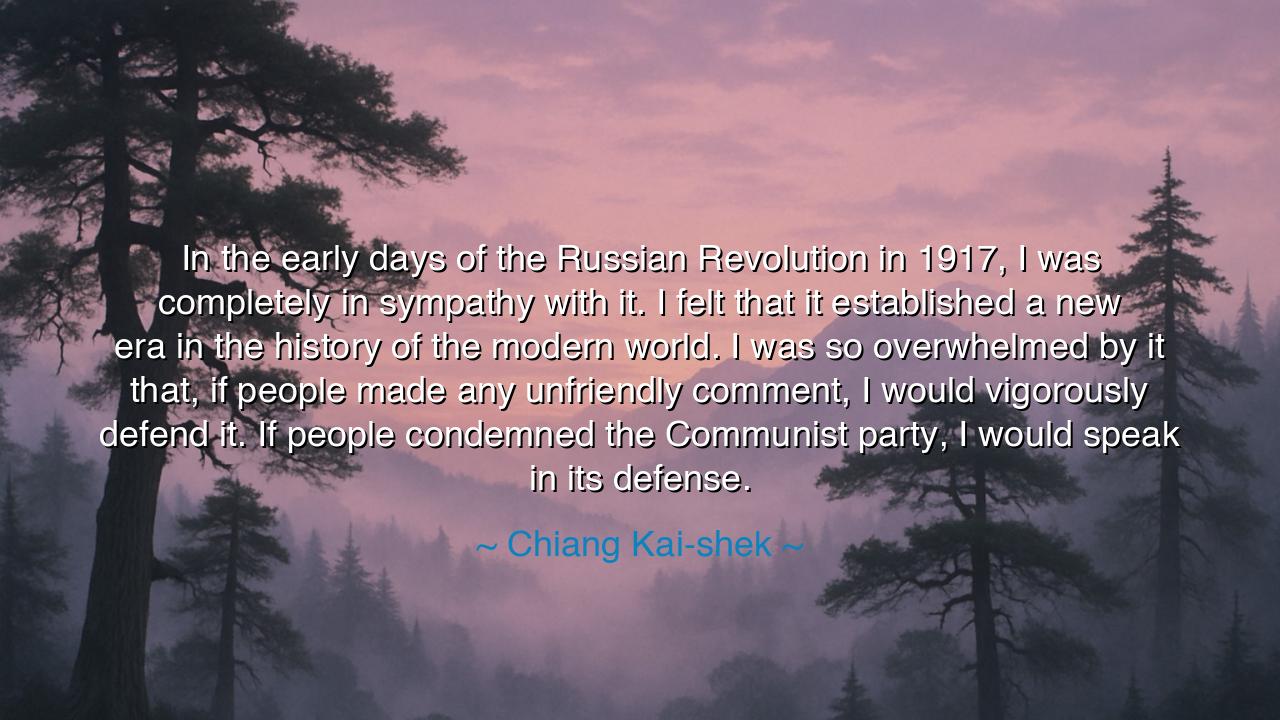
In the early days of the Russian Revolution in 1917, I was
In the early days of the Russian Revolution in 1917, I was completely in sympathy with it. I felt that it established a new era in the history of the modern world. I was so overwhelmed by it that, if people made any unfriendly comment, I would vigorously defend it. If people condemned the Communist party, I would speak in its defense.






Hear now the solemn testimony of Chiang Kai-shek, the soldier-statesman who bore the weight of a nation’s destiny: “In the early days of the Russian Revolution in 1917, I was completely in sympathy with it. I felt that it established a new era in the history of the modern world. I was so overwhelmed by it that, if people made any unfriendly comment, I would vigorously defend it. If people condemned the Communist party, I would speak in its defense.” These words carry the fire of youth and the spirit of conviction, yet also the shadow of later disillusion, for they reveal the journey of a man who once believed in the promise of change with all his soul.
In 1917, the world trembled. The old empires, heavy with centuries of dust, were crumbling. The Russian Revolution erupted like a thunderclap across the earth, proclaiming that kings could fall and that the oppressed could rise. To young visionaries across nations, it seemed the dawn of a new era, a rebirth of justice in an age shackled by greed and empire. Chiang Kai-shek, himself yearning for the renewal of his beloved China, felt the pulse of this upheaval in his veins. He saw in it not merely Russia’s transformation, but a beacon that promised liberation to all peoples ground beneath the heel of tyranny.
History teaches us that such fervor is not rare. Recall the French Revolution, when men and women, weary of crowns and chains, rose with cries of “Liberty, Equality, Fraternity.” The early days were filled with hope, and poets, philosophers, and soldiers alike defended the cause with burning passion. But as the tides of blood and betrayal came, many who had once embraced it recoiled. Chiang’s early defense of the Communist party echoes this same ancient pattern: the spirit of men longing for justice, embracing with zeal the promise of renewal, even before they glimpse the costs that such upheaval will demand.
In his words, we also hear the yearning of the young: the willingness to defend one’s beliefs with fire, the unyielding loyalty to an ideal before it is tempered by the wisdom of age. Chiang speaks of sympathy so complete that he could not bear to hear a word against the movement. This reveals a universal truth—when men and women believe they are witnessing the birth of a new dawn, their hearts are captured, and they defend it not with reason but with devotion. Such passion can inspire courage, but it may also blind, for the flame of conviction burns both brightly and dangerously.
Yet we must not scorn such fervor, O seeker, for without it, no great cause would ever be born. The new era is always ushered in by those who believe so deeply that they risk ridicule, rejection, even ruin. Chiang’s defense of the revolution reminds us that hope itself is a noble force, though history may later reveal flaws and failures. The mistakes of visionaries do not erase the purity of their longing for justice. In their zeal, we glimpse humanity’s eternal striving toward something greater than itself.
The lesson, then, is this: be bold enough to believe in change, but wise enough to test your belief against truth. Do not mock those who throw themselves into a cause with passion, for their fervor is the seed of transformation. Yet, guard your heart from blindness; know that every revolution, every party, every ideology must be judged not only by its promises, but by its fruits.
Therefore, O child of tomorrow, let Chiang’s words remind you of the power of conviction and the peril of unchecked loyalty. In your own life, when you feel overwhelmed by a vision, defend it boldly, but do not cease to question. Believe in the dawn of new eras, but watch carefully for the shadows they may bring. In this way, you may keep both the fire of youth and the wisdom of age, walking the narrow path where passion and truth walk hand in hand.
So remember: to live is to choose, to believe is to gamble, and to defend an ideal is to risk both glory and regret. Let your sympathy be strong, but let your wisdom be stronger, and may your decisions, like Chiang Kai-shek’s confession, endure as a beacon for those who seek to balance hope with truth.






AAdministratorAdministrator
Welcome, honored guests. Please leave a comment, we will respond soon